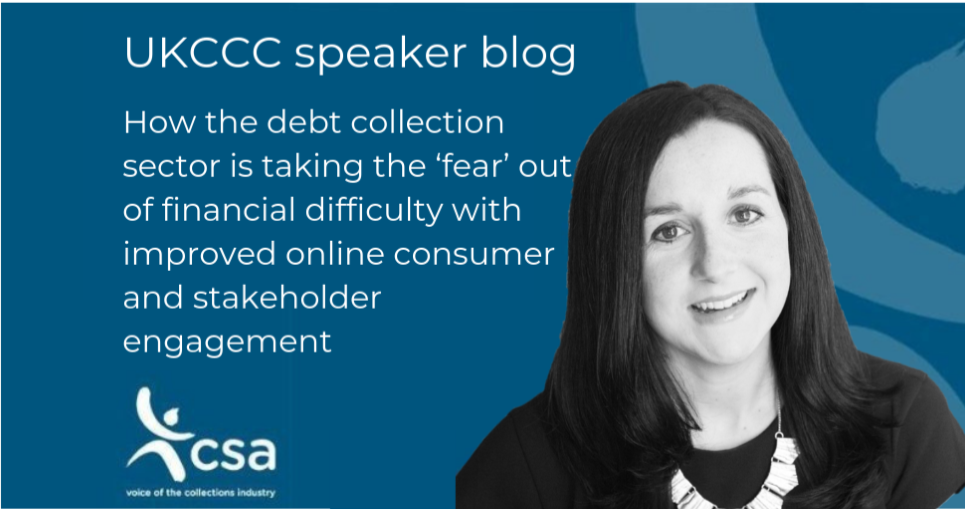Blog originally published on the Credit Services Association website here.
Reputation, reputation, reputation: How the debt collection sector is taking the ‘fear’ out of financial difficulty with improved online consumer and stakeholder engagement – and what still needs to be done to tackle the ‘debt taboo’.

I first started working with the debt collection sector back in 2013 when Engage Comms was commissioned by the Credit Services Association (CSA) to carry out a digital communications research project into the online reputation of its debt collection agency and debt purchase members. We now work closely with the CSA and other related organisations including the Money Advice Liaison Group (MALG) on strategic communications with the long-term aim of improving the lives of people in debt.
The research project we carried out in 2013 was triggered by ongoing concern amongst the CSA and its member about negative comments mentioning them online and increasing scrutiny and pressure from stakeholders and consumers including the impending Financial Conduct Authority (FCA) authorisation of the industry. The aim of the research was to investigate the scale and nature of the problem and its reputational, commercial, and social impact for the CSA, its members, and their clients and customers, providing the intelligence needed to implement best practice online communications in order to make the industry ‘fit for the future’.
A fresh perspective on a long-term problem
Knowing very little about the debt collection sector, we approached the research from a completely fresh perspective. As marketing communications professionals, one obvious thing became clear: debt collection is not a financial services industry, it is a ‘people’ industry with the main goal being to make contact with consumers who, because of the highly sensitive and emotive nature of the topic to be discussed, are more likely than most to be vulnerable and, even if they aren’t, are still likely to be tentative about the subject. A debt collection agency’s main objective for their clients is to do what the original creditor has failed to do – open dialogue with the consumer to determine whether or not they are able to pay and then find a mutually beneficial resolution that is affordable for the consumer and recovers the funds for the client.
It seemed immediately apparent to us that the key skills employed by these companies should be empathy, communication, and education. However, looking online, we found a situation whereby many of the people these companies were trying to make contact with not only actively avoided engaging with them but believed that doing so would be detrimental rather than beneficial to their current financial situation because of historical practices and deeply ingrained cultural beliefs about the nature of debt collection and personal finances generally.
How did this happen?
The 2013 research report we produced looked in depth at exactly what was happening when consumers received debt collection letters from companies they didn’t recognise. It identified common attitudes and behaviours being displayed online by consumers in forums and on social media. After Googling the company name and finding a corporate website (or no website at all in the case of 13% of companies at the time) of which content predominantly addressed clients and only 10% of websites at the time providing basic information for consumers, consumers were enticed by online forum threads about the company which ranked very highly on Google searches because of the sheer volume of comments and engagement. Once engaged in these forums and taking advice from anonymous and often unverified ‘advisers’, consumers’ initial uncertainty was being escalated into complete distrust, fear and avoidance of the companies. This was fuelling a much bigger societal problem around personal debt and finances being taboo and consumers not seeking help quickly enough or being able to resolve their issues in an affordable way with minimum impact to their mental health and financial situation.
What the research did was hold up a mirror to the CSA and its members to help them see that, although they had already come a long way in raising standards and putting ‘treating customers fairly’ at the heart of what they do, the industry’s own fears about talking openly about such a sensitive subject (online and on their websites) meant that they were struggling to reassure people that they could be trusted.
Marketing 101 – understanding your proposition and audience
In basic terms, the fundamental problem that the CSA and its members were facing in 2013 was that they had misunderstood what their proposition to their customer was and did not properly identify the target audience for external corporate comms. It appeared from their online presence that the CSA was purely ‘acting on behalf of its members’ and from members’ online presence that they were purely acting on behalf of their clients – but no one was talking to the end customer. This left a gulf for these anonymous and unverified ‘advisers’ on online forums and made it hard for third parties such as the debt advice sector for example to endorse them.
We could see that behind the scenes, the CSA and its members were already changing their business model to put the end customer at the heart of everything they did, but it appeared to the outside world from their online presence that this wasn’t the case. This was partly fuelled by their own ‘fear’ of engaging because of the negative reputation and connotations that existed around the subject matter and industry. Fear breeds fear and this wasn’t helping anyone.
Customer insight – talking their language
In the digital age, market research and customer data/intelligence has never been easier to come by. The online consumer forums we investigated in 2013 were a goldmine of insight into how customers felt when they were contacted by a debt collection agency. We found a clear disconnect between the language they were speaking and the language the CSA and its members were using on their corporate websites. What most consumers were really looking for was reassurance and the industry’s online presence at that time wasn’t giving them that.
Lack of reassurance and engagement with consumers online was exacerbating reputational problems which in turn was impacting negatively on outcomes for consumers. Once it was clear that openness, transparency, dialogue and communication were key to addressing these issues, and that there was both an ethical and business case for this, significant transformation took place with the industry now leading the way on customer fairness and engagement in the financial services sector.
In May 2019, we carried out a distilled version of our 2013 research, six years on. We found that all CSA members now have professional, user-friendly, consumer-facing websites with content and digital tools designed to reassure and support customers. Some have also embraced social media very successfully to open compliant and engaging dialogue with audiences. In light of the digital communications recommendations made in the original 2013 report being implemented, as well as other contextual factors around FCA authorisation and other market changes (the rise of fintech, and a continuing shift in general consumer and influencer behaviours and attitudes online and off), the use of online forums to seek advice on dealing with CSA member companies has dramatically reduced. In the online consumer forum threads that are still posted about CSA members in 2019, the report found that feelings of distrust have shifted towards feelings of uncertainty; belief that companies are deliberately trying to mislead them has shifted towards belief that there is a misunderstanding; and advice to avoid companies has shifted towards advice to act as quickly as possible to resolve the issue.
I recently did an interview with Steven Coppard of the Cabinet Office who I will be sitting alongside on a panel at the CSA’s UK Credit & Collections Conference in September 2019 and he agreed that this isn’t ‘just semantics’; language matters. Transforming government debt collection practices to replicate the success of the CSA and its members in putting the customer first, going above and beyond compliance to operate at the highest possible standards, is Steve’s ‘passion project’. However, he identified a ‘final hurdle’ that they must overcome: Consideration should be given to rebrand themselves as ‘debt resolution agencies’ because that is what they now do. The business model has changed from being all about ‘quick win’ collection rates to being focused on long term customer outcomes.
Collaboration is king
The ‘re-run’ of the research project that we carried out in May highlighted that, while the CSA and its members have come such a long way, there is a missing piece of the puzzle that now needs to be addressed by others on their behalf. Trust can’t be built by an industry on its own; it needs endorsement from third parties to back it up. The 2013 research highlighted a key driver of consumers’ fear around debt and personal finances was confusion. In 2019, we found that consumers are still asking questions about engaging with debt collection agencies. This has left a gulf that is being filled by companies who are promising to help consumers ‘fight’ rather than engage with CSA members; a silver bullet that unfortunately does not exist and consumers are likely to end up worse off as a result.
The digital age has brought with it increasing ‘information overload’ and with that, increased confusion and mixed messages for consumers in debt. If there was a tendency for people to bury their heads before, it is arguably even easier for them to do that now. Government, the debt advice sector, consumer campaign groups, think tanks, politicians, different factions of the financial services industry, and others are all working hard (sometimes together) to address the problem. However, educating and reassuring consumers that they can trust CSA member companies who are signed up to a Code of Practice, needs a clearer joint voice – something the CSA itself has been working on over the last number of years.
I’m looking forward to discussing what needs to happen next on the panel session at UKCCC on Thursday 12 September in Newcastle. I’m also very much looking forward to Lexi Mills’ keynote presentation on ‘technology, language and business’ which I have just done a fascinating interview with her on for the next CSA blog. Find out more about the programme and book your place here: https://www.csa-uk.com/mpage/conference2019.



